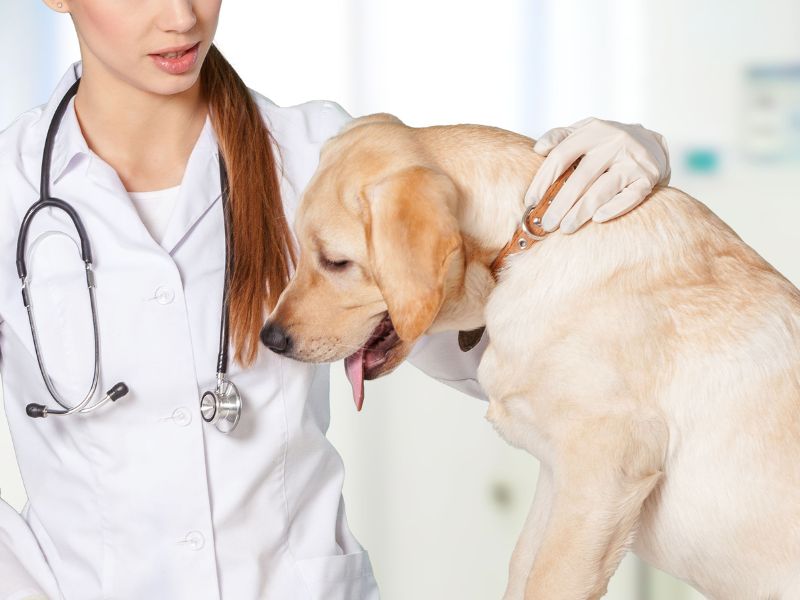
Labrador Retrievers are super popular pups around the world. They’re loved for being friendly, smart, and super loyal. But, just like any breed, Labs can have some health hiccups that owners need to watch out for. One big issue that often pops up in Labradors is hip dysplasia, which can make it tough for them to walk and cause pain in their hip joints. Another big problem is obesity, which can trigger a whole bunch of other health troubles like heart issues, joint pain, and diabetes. Labs can also battle ear infections, allergies, and eye troubles. But don’t fret! With a little TLC, Labradors can live long and happy lives. Making sure they get enough exercise, eating right, and regular check-ups at the vet are key to keeping your Lab in tip-top shape. By staying on top of any potential health problems and taking steps to prevent them, you can make sure your furry friend stays wagging their tail for years to come.
Is It Possible to Keep Your Labrador Healthy? Labradors typically enjoy good health, but there are steps you can take to ensure they remain in peak condition. Here are a few suggestions for maintaining your furry companion’s well-being: 1. Exercise regularly: Labradors are energetic dogs that require ample physical activity to stay fit. Take your pup for daily walks and engage them in games like fetching to keep them stimulated. 2. Provide proper nutrition: A well-balanced diet is crucial for your Labrador’s overall health. Be sure to feed them food tailored to their age and activity level, and refrain from overindulging them with treats or human food, as this can contribute to weight gain and other health issues. 3. Schedule routine vet visits: Regular check-ups with your veterinarian can help detect any potential health concerns early on. Remember to schedule annual examinations for your Labrador and ensure they stay up to date on vaccinations. 4. Maintain grooming practices: Regular grooming is beneficial for your Labrador’s well-being. Brush their fur frequently to prevent shedding and matting, keep their nails trimmed, and clean their ears to prevent infections. By incorporating these guidelines into your routine, you can play a key role in ensuring your Labrador remains healthy and content for years to come.

Labrador Retrievers are typically robust dogs that can live up to 10 to 12 years. They have sturdy bodies and are known for their lively demeanor and friendly personality. However, like any breed, they can experience health issues. An issue that commonly affects Labs is obesity. These dogs have a hearty appetite and may overindulge if given the opportunity. Obesity can lead to various health problems, such as heart disease, joint issues, and diabetes. It is essential to monitor a Lab’s food intake and ensure they get enough exercise to maintain a healthy weight. Labs are also susceptible to joint conditions like hip dysplasia and elbow dysplasia, which have a genetic component. While the specific genes responsible for these conditions remain unidentified, regular exercise and a balanced diet can help reduce the risk. It is vital to have a veterinarian periodically assess a Lab’s joint health. In summary, although Labrador Retrievers are typically healthy, they can develop health issues. Proper care, including a nutritious diet, regular physical activity, and routine veterinary examinations, is crucial for ensuring Labs lead long and healthy lives.

If your Labrador is feeling under the weather, it can be a worrying time for both you and your furry companion. Acting promptly is key to ensuring a speedy recovery for your beloved pet. Here are some tips on what to do when your Labrador is feeling unwell. Step 1: Observation is Key Start by closely observing your Labrador’s symptoms. This will give you a better understanding of how serious the illness may be and whether immediate medical attention is required. Keep an eye out for signs like vomiting, diarrhea, lack of energy, loss of appetite, and breathing difficulties. Step 2: Reach Out to Your Vet If you notice any concerning symptoms, don’t hesitate to contact your veterinarian. They can offer guidance on the next steps to take and may suggest bringing your dog in for an examination. Remember, it’s always better to be safe than sorry when it comes to your pet’s health. Step 3: Stick to the Plan Follow your veterinarian’s recommendations carefully when it comes to caring for your sick Labrador. This could involve administering medication, making changes to their diet, or other treatments. By following their advice to the letter, you’ll give your dog the best chance at a full recovery. Step 4: Keep an Eye on Progress Keep a watchful eye on your Labrador as they bounce back from their illness. Monitor their symptoms, appetite, and activity levels closely. If you notice any worrisome changes, don’t hesitate to contact your vet right away. By following these steps, you can ensure that your Labrador gets the support and care they need when they’re feeling under the weather. Remember, swift action and close attention are crucial when it comes to your pet’s health and well-being.

Labradors are typically healthy dogs, but they can still get sick or injured like any other living being. It’s important to know when to contact the veterinarian to make sure your furry pal gets the necessary medical care. Here are some situations where reaching out to the vet is recommended: 1. Sudden Changes in Behavior If your Labrador suddenly starts acting lethargic, aggressive, or excessively vocal, it could indicate an underlying health issue. In such cases, it’s wise to give the vet a call and have your pet checked out. 2. Digestive Problems Issues like vomiting, diarrhea, and constipation are common in dogs, but they might also point to a more serious health problem. If your Labrador is experiencing any of these digestive symptoms, it’s best to contact the vet for medical attention. 3. Breathing Troubles Labradors struggling to breathe, with symptoms like wheezing, coughing, or excessive panting, could be showing signs of a respiratory condition. In such instances, it’s advisable to call the vet and seek professional help. 4. Injuries If your Labrador gets injured, such as a broken bone, a deep wound, or significant bleeding, it’s crucial to get medical help immediately. Reach out to the vet in these cases and follow their instructions carefully. 5. Uncommon Symptoms Should your Labrador display any unusual symptoms like seizures, loss of appetite, or sudden weight loss, don’t hesitate to call the vet and schedule an examination. These atypical signs could point to an underlying medical issue that requires prompt attention. Remember, when it comes to your furry friend’s health, it’s better to be cautious. If you’re unsure whether your Labrador needs veterinary care, it’s always a good idea to contact the vet and ask for their guidance.

Labrador puppies are born unable to see or hear, and they rely completely on their mother for warmth, milk, and protection. The first few weeks of a puppy’s life are crucial for their growth and development, so it’s important to create a safe and cozy environment for them. As they start to grow, puppies will open their eyes and ears and begin to explore their surroundings. This is also when they will start teething and will chew on anything they can find. It’s essential to provide them with appropriate chew toys to prevent them from damaging household items. Labrador puppies have a big appetite and can easily overeat, so it’s crucial to monitor their food intake and make sure they are on a balanced diet to help them grow healthy and strong. Check the recommended daily food intake based on their weight in the table below. Weight Daily Food Intake 5-10lbs 1/2 – 1 cup 10-25lbs 1 – 2 cups 25-50lbs 2 – 3 cups 50-75lbs 3 – 4 cups 75-100lbs 4 – 5 cups Along with a balanced diet, socialization from a young age is vital for Labrador puppies. Exposing them to various people, animals, and environments will help them become well-adjusted adults. Early training is also key to preventing bad habits from forming. Labrador puppies may require a lot of care and attention, but with the right care, they will grow up to be happy and healthy dogs.

Labrador puppies are typically full of energy and playfulness, but it’s important to watch out for any unusual signs that could indicate a health issue. – If a Labrador puppy is unusually tired and not interested in playing, it might be a sign of an underlying health condition that needs to be checked by a vet. Puppies are naturally active, so any sudden lethargy should be taken seriously. – Loss of appetite in a Labrador puppy, known for their love of food, could be a red flag for a health problem. A sudden disinterest in eating could be caused by illness, stress, or environmental changes, so it’s important to seek veterinary advice if it lasts more than a day or two. – Diarrhea is a common issue for puppies, but if it persists for more than a couple of days, it may indicate a more serious health problem that requires attention from a vet. – Vomiting in puppies can also be a cause for concern, especially if it is happening frequently or causing distress. While some occasional vomiting is normal, persistent vomiting could be a sign of an underlying health issue that needs to be addressed by a professional. In conclusion, it’s crucial for Labrador puppy owners to be vigilant about any changes in their pet’s behavior. If a puppy is showing signs of lethargy, loss of appetite, diarrhea, or frequent vomiting, it’s best to seek veterinary care to ensure their well-being. Additionally, special attention should be given to puppies under eight weeks old, as they may require additional care and monitoring.

Taking care of Labrador puppies under eight weeks old is crucial for their growth and well-being. These young pups are still developing their immune systems and exploring their surroundings. It is important to pay special attention to their feeding schedule, as they should be fed four to six small meals a day to ensure they are getting the necessary nutrients. Creating a safe and comfortable environment for the puppy is also key. Providing a designated sleep and play area, along with plenty of toys and chew items, can help with their teething and overall development. Socialization is another important aspect of caring for a young Labrador, as they should be exposed to new people, animals, and environments to become well-adjusted adults. It is essential to be cautious and avoid exposing the puppy to potential sources of illness, such as unvaccinated dogs or crowded areas. Owners should consult with their veterinarian or reputable online resources like the American Kennel Club and PetMD for guidance on nutrition, exercise, and common health issues. Staying up-to-date on vaccinations, regular check-ups, and genetic testing for diseases like hip dysplasia is crucial for the long-term health of Labradors. By taking preventative measures and staying informed, owners can ensure their beloved Labs grow up to be happy and healthy adults.

At times, pet parents may not be satisfied with the diagnosis or treatment provided by their veterinarian. In such situations, it is crucial to discuss any worries or uncertainties with the vet. If the problem persists, it might be a good idea to seek a second opinion from another vet. When opting for a second opinion, it is essential to share all the relevant details about the pet’s medical history, such as previous diagnoses, treatments, and medications. This will help the new vet have a complete understanding of the pet’s health and make an accurate assessment. Alternatively, seeking advice from online platforms or forums is an option. However, it is important to exercise caution when relying on such sources, as not all of them may be trustworthy. Consulting a certified veterinarian is always the best course of action for any health-related issues. Miscommunication between the pet parent and the vet could also be a factor in the problem. Asking questions and voicing any concerns or doubts is key to ensuring that both parties are in sync and working towards the best outcome for the pet’s well-being.


